
To celebrate the 17 days of competition at the Olympic Games Tokyo 2020, each day we will celebrate the power of sport and its influence in relation to each of the 17 Sustainable Development Goals (SDGs).
Today is dedicated to Goal 3: Good health and well-being. This Goal addresses all major health priorities, including reproductive, maternal and child health; communicable, non-communicable and environmental diseases; universal health coverage; and access for all to safe, effective, quality and affordable medicines and vaccines.
- The right to health serves as the basis for achieving healthy lives through physical activity and sport.
- Physical inactivity has been identified as the fourth leading risk factor for global mortality by the World Health Organization. Regular sport is a countermeasure available to nearly everyone, which can also address the economic impact of physical inactivity.
- Sport and physical activity reduce the risk of contracting non communicable diseases by strengthening cardiovascular health in particular. Participation in sport can contribute to tackling and preventing obesity.
- Sport encourages individuals, including the elderly, to adopt active lifestyles. It has a positive impact on child and healthy adolescent development and well-being.
- Sport can help reduce infant, child and maternal mortality and improve post-natal recovery by increasing personal fitness of mothers and contributing to the prevention of play-related deaths. By implementing child safeguarding measures, sport programmes can ensure the safety and well-being of children and cause change in other sectors by setting a good example.
- Sport-based education programmes are a viable platform for health education, including for hard-to-reach groups, particularly to disseminate information on sexual and reproductive health, alcohol and substance abuse, as well as communicable diseases such
as malaria and HIV/AIDS. - Sport-based social programmes promote mental well-being for at-risk communities through trauma counselling and inclusion efforts. Sport can enhance mental health by delivering social, psychological and physiological benefits.
- Sport programmes in refugee camps which are run as organized projects on a continual basis can deliver social, psychological and physiological benefits.
- Sport can promote sustainable lifestyles and encourage demand for sustainable consumption of goods and services. Sport can raise awareness about the need for sustainable consumption and production for healthy life and healthy people.
- Sport can promote the importance of clean air for health and can provide sustainable solutions.
Click here for a list of examples of how sport addresses the SDG 3
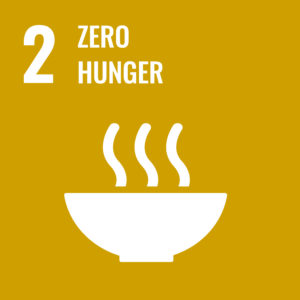
To celebrate the 17 days of competition at the Olympic Games Tokyo 2020, each day we will celebrate the power of sport and its influence in relation to each of the 17 Sustainable Development Goals (SDGs).
Today is dedicated to Goal 2: End hunger, achieve food security and improved nutrition and promote sustainable agriculture
Goal 2 of the 2030 Sustainable Development agenda seeks to end hunger and all forms of malnutrition, and double agricultural productivity in the next 15 years. Ensuring this sustainable access to nutritious food universally will require sustainable food production and agricultural practices.
- Sport-based initiatives can mobilize resources, both financial and in-kind, for assisting vulnerable communities in the field or for awareness raising activities that can mobilize the public towards ending hunger.
- The right to adequate food is required for participation in sport. Sport can promote balanced diets, educate individuals with regard to sustainable food production, and encourage improved nutrition that discards industrially processed food items and replaces them by natural and healthy food.
- Sport-based activities are a viable platform to disseminate information and messages on nutrition, issues that affect food security around the world, and the global zero hunger target.
- Support gathered through sport-based initiatives is fundamental to building the Zero Hunger Generation; to achieve Zero Hunger by 2030, it is necessary to engage the public and encourage them to drive political, business and societal decisions that can effect world change.
- Sport can raise awareness on food waste and create educational initiatives to change behaviors towards a sustainable future. Organizations can set an example by sourcing food from sustainable and responsible producers. Sport can be an enabler to build capacities and best practices for food waste management in order to tackle food waste in sport, as well as to put systems in place to reduce food waste impact especially at sport events.
Click here for a list of examples of how sport addresses the SDG 2
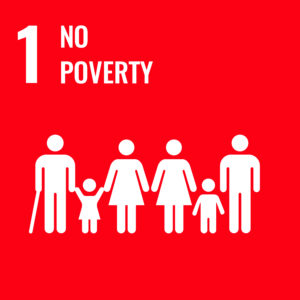
To celebrate the 17 days of competition at the Olympic Games Tokyo 2020, each day we will celebrate the power of sport and its influence in relation to each of the 17 Sustainable Development Goals (SDGs).
Today is dedicated to Goal 1: End poverty in all its forms everywhere.
Goal 1 calls for an end to poverty in all its manifestations by 2030. It also aims to ensure social protection for the poor and vulnerable, increase access to basic services and support people harmed by climate-related extreme events and other economic, social and environmental shocks and disasters
- Sport values such as fairness and respect can serve as examples for an economic system that builds on fair competition and supports an equal sharing of resources. Reinforcing competencies and values such as teamwork, cooperation, fair-play and goal-setting, sport can teach and practice transferable employment skills which can support employment readiness, productivity and income-generating activities.
- Sport can be used as a platform to speak out for the realization of human rights, including the right to an adequate standard of living, the right to social security and the equal rights of women in economic life, which have direct impacts on the goal to end poverty. Sport can also be used as a platform to campaign for socio-economic progress and raise funds to alleviate poverty.
- Sport initiatives can raise and generate funds for poverty programmes, as well as assist in raising awareness and facilitating the mobilization of needed resources to alleviate poverty through partnerships with local and international bodies.
- Sport can promote personal well-being and encourage social inclusion which may lead to larger economic participation. It can help educate empower individuals with social and life skills for a self-reliant and sustainable life.
- Sport programmes in refugee camps can help young people understand the need for cooperation as well as self-reliance. Involvement in sport programmes can provide stability and a safe environment for homeless individuals.
- Sport is itself a productive industry with the ability to lift people out of poverty through employment and contributing to local economies. Sport and sustainable sport tourism can promote livelihoods, including in host communities of sport events.
Click here for a list of examples of how sport addresses the SDG 1
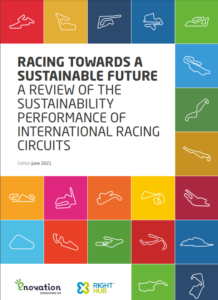
Racing towards a sustainable future: a review of the disclosed sustainability performance of international racing circuits (2021 edition)
First of its kind, using data collected in 2020, this white paper defines the Sustainable Circuits Index (SCI), providing a state-of-the-art view of what top tier motorsport venues are doing and disclosing, ending with important reflections for the sector’s stakeholders.
Click here to download the white paper





Changing the game: A critical analysis of accountability in Mega Sport Event infrastructure delivery
20 May 2021
The final instalment of the EAP Insights: Changing the Game research series explores the issue of accountability in the delivery of Mega Sport Event (MSE) infrastructure projects. Increasing accountability is a key means of improving the governance of these events and addressing the issues of labour rights and corruption which the Changing the Game series previously discussed.
This paper explores the meaning of accountability as an overarching value to improve the governance of MSEs and the delivery of related infrastructure. We highlight the challenges of establishing accountability mechanisms, explore the consequences that a lack of accountability can generate in addition to corruption and labour exploitation, and discuss how channels of civic engagement can help close the accountability gap. We also present recommendations that we believe are key to overcoming these challenges. including spaces for multi-stakeholder dialogue and the application of access to information laws.
Click here to access the paper



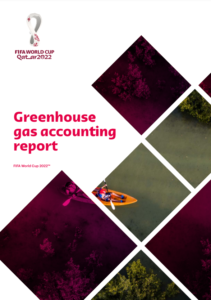
The next FIFA World Cup will take place in Qatar from 21 November to 18 December 2022. Qatar is the first Middle Eastern nation and also the smallest country to host a FIFA World Cup. All stadiums will be within 50km
of the centre of Qatar’s capital city, Doha, keeping travel between matches to a minimum.
Among many other activities, staging the tournament entails the construction and renovation of relevant infrastructure, transporting thousands of people to the matches and Fan Fests, the provision of accommodation, managing waste in the stadiums and broadcasting fixtures in over 200 countries. This scale inevitably has an impact on the climate, yet conscientious sustainability efforts can mitigate its impact.
As the three organisers of this mega event, FIFA, the FIFA World Cup Qatar 2022 LLC (Q22), and the Supreme Committee for Delivery & Legacy (SC) are committed to protecting and conserving the environment. As part of their joint FIFA World Cup Qatar 2022™ Sustainability Strategy, they have pledged to measure, mitigate and offset all FIFA World Cup 2022 greenhouse gas (GHG) emissions, while advancing low-carbon solutions in
Qatar and the region. As a first step, it is important to understand the emissions related to the preparation, staging and post-event activities of the FIFA World Cup.
For this reason, FIFA, Q22 and the SC have conducted an analysis of the projected GHG emissions resulting from the FIFA World Cup 2022 with the support of subject matter experts.
The GHG accounting and reporting procedure used for this report is based on the Greenhouse Gas Protocol, the most widely used international accounting tool for government and business leaders to understand, quantify and manage greenhouse gas emissions. The system boundaries follow the operational-control approach. The reporting period includes tournament-related activities under the control of the organisers between
April 2011 and June 2023.
Click here to download the report



Created by the 11th Hour Racing Team, for the benefit of the wider community, a series of eight How to Guides and Case Studies are part of the TOOLBOX which is designed to make sustainability accessible for any organisation.
Whilst every effort and care was taken when preparing the contents of these guides, applying sustainability is specific to each organization. It is up to the user to make the relevant choices and define what aspects are right to include, important to address or are legally mandatory.

The steps are as follow
- How to start your program
- How to create a policy
- How to engage stakeholders
- How to identify issues
- How to set targets
- How to plan and implement
- How to assess progress
- How to report and communicate
Go to www.sustainabilitytoolbox.com to know more about the Toolbox and to download the various tools, templates and case studies available


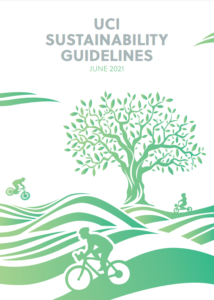
These guidelines aim to provide simple, practical and essential information on key aspects of sustainability. It is a tool that will help National Federations, Event Organisers, Teams, and other cycling stakeholders navigate this subject’s complexities and start the journey to developing effective sustainability programmes.
Section 1
Introduces the UCI’s commitment to sustainability and its four pillars, which are the foundation for transforming our sport, and outlines the role cycling can play in an increasingly challenging world.
Section 2
Gives a broad overview of sustainability, the United Nations Sustainable Development Goals, the ISO 20121 management system, and where to start with taking climate action.
Section 3
Contains short overviews, providing a reference point for cycling’s essential focus areas, with case studies of sustainability in practice from cycling organisations around the world.
Section 4
Provides checklists highlighting best practice to help organisers deliver sustainable events that maximise positive and minimise negative impacts on people and the planet. These actions are neither exhaustive nor compulsory. Organisers must think about what is important and realistic for events according to specific local conditions and plan to address priority objectives.
Section 5
Contains tools and resources to advocate for cycling as a mode of transport and encourage better inclusion within our sport.
These guidelines will become an integral part of the sport’s journey towards sustainability.
Additional support for cycling stakeholders will be hosted on the UCI website with dedicated
sustainability action plans, tools and resources for specific user groups.
Click here to download the guidelines
Click here for more information about UCI activities towards sustainability




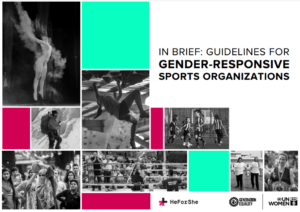
Guidelines for gender-responsive sports organizations have been developed as a trail-blazing effort to translate the UN Women’s Sports for Generation Equality principles into a feasible step-by-step guide.
The guidelines are structured to help sports organizations in terms of empowerment of women and girls and advancement of gender equality through concrete and quantifiable actions and indicators. They aim to mobilize action on gender equality in day-to-day and overall operations.
Authors/editor(s): Lead author: Professor Canan Koca Co-author: Professor Rosa Lopez de D’Amico Prepared for publishing by UN Women staff: Asya Varbanova, Günes Deren Erbas, Ipek Naz Çınar, Jennifer Cooper, Sinem Aydın and Zeliha Ünaldı Editor: Gretchen Luchsinger, Ece Simin Civelek Design: Asya Fatma Bagcı
Publication date: May 2021


In July 2018 a deadly heat wave struck Japan, with 40°C temperatures leaving over 1,000 dead and 22,000 in hospital with heatstroke. Heat waves hit again in the summers of 2019 and 2020, leaving thousands in hospital as temperatures across the country topped 39°C.
The mean annual temperature in Tokyo, the capital city and host of the 2021 Olympics, has increased by 2.86°C since 1900, more than three times as fast as the world’s average.
Since the 1990s Tokyo residents have frequently experienced more days when the maximum daily temperature exceeds 35°C.
Multiple factors can lead to intense heat and high levels of humidity, but the 2018 heat wave “could not have happened” without climate change say scientists. As Olympic stars, their coaches and heat experts explain in this report, intense heat and high levels of humidity are a threat to athletes at the 2021 Tokyo Olympics.
This study hears from leading triathletes, rowers, tennis players, marathon runners and scientists advising athletes how to cope in extreme conditions. All love their sports and are passionate about the Olympics. Yet all voice fears that climate impacts will affect their health and performance in Tokyo this summer.
